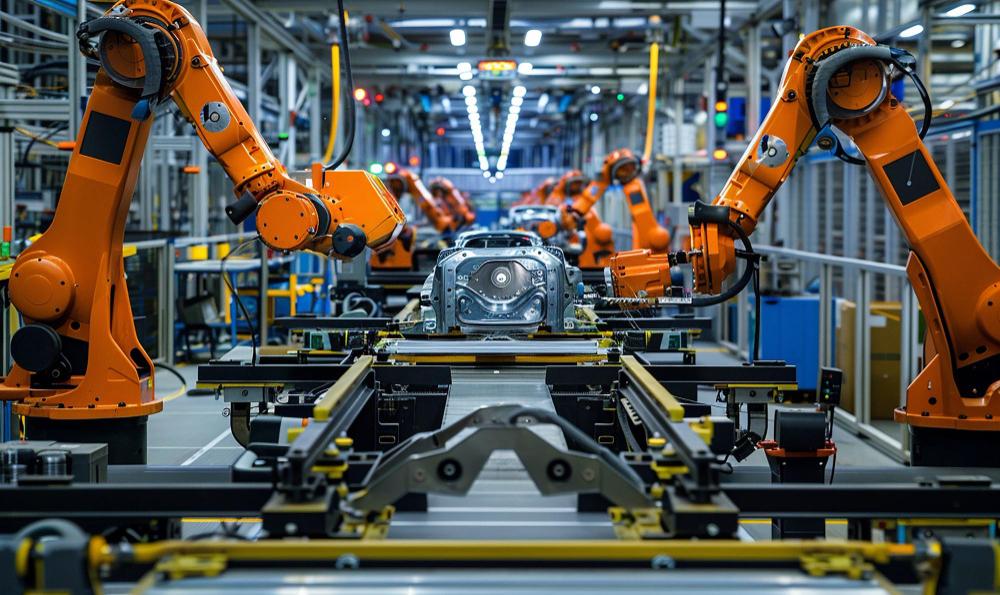By 2025, McKinsey predicts that 50 billion devices will be connected to the Industrial Internet of Things (IIoT), with 70% of manufacturers expected to utilise digital twins. This transformation signifies the dawn of the Fourth Industrial Revolution, also known as Industry 4.0, characterised by cyber-physical systems, IoT, cloud computing, and artificial intelligence (AI). As manufacturers embrace this digital era, Microsoft Dynamics 365 (D365) is leading the charge by equipping businesses with the capabilities they need to thrive in an increasingly automated and connected world.
Below, we explore how D365 supports manufacturers in navigating digital transformation and staying competitive in an Industry 4.0 landscape.
Integration of AI and IoT for Real-Time Monitoring and Control
By 2025, IoT is expected to generate an economic value ranging from $4 trillion to $11 trillion. At the heart of Industry 4.0 is the convergence of AI and IoT for real-time monitoring. Microsoft Dynamics 365 uses Machine Learning to connect with IoT sensors, providing manufacturers with instant visibility into their equipment, production lines, and supply chains. This real-time data collection and analysis improve efficiency, reduce downtime, and enhance operational control.
With D365, manufacturers gain insights into machine performance, predict maintenance needs, and optimise production schedules. This capability transforms traditional manufacturing into intelligent, self-optimising systems capable of adapting swiftly to changing demands.
Optimising Supply Chain Management with Digital Twins
Digital twins -virtual replicas of physical assets, systems, or processes, play a pivotal role in supply chain optimisation. By creating a digital twin of the supply chain, manufacturers can simulate different scenarios, optimise logistics, and assess the impact of changes in real time.
McKinsey reports that this technology can reduce development times by up to 50%, cutting costs in the process. Microsoft highlights that businesses using D365 have seen cost reductions of 10-15% by integrating inventory and sales data into a single system, enhancing visibility and control.
Digital twins enable manufacturers to pre-emptively address bottlenecks, optimise logistics, and enhance delivery times. By mirroring products in service, companies can also adjust designs in real-time, significantly reducing time-to-market.

Enhanced Collaboration through Connected Systems
Industry 4.0 places a strong emphasis on collaboration across organisations, departments, and external partners. D365 helps break down silos by integrating diverse systems, applications, and data into one cohesive platform, enabling seamless collaboration.
This connected environment improves communication, streamlines processes, and accelerates decision-making. By fostering a culture of collaboration, manufacturers can enhance supply chain efficiency and responsiveness.
Scalable Cloud Infrastructure for Global Operations
Cloud technology is an essential enabler of digital transformation. Built on Microsoft’s Azure cloud platform, D365 provides manufacturers with a scalable, secure, and robust infrastructure that supports global operations.
Cloud-based solutions allow manufacturers to quickly deploy new capabilities, expand into new markets, and enable remote work and collaboration. D365’s scalability ensures manufacturers can easily adjust to fluctuations in demand without significant upfront IT investment.
Driving Personalisation and Mass Customisation
Industry 4.0 is shifting the focus toward greater personalisation and mass customisation. Today’s consumers increasingly expect products tailored to their specific preferences. D365 supports this by integrating customer data with production processes, allowing manufacturers to analyse customer preferences, order history, and market trends.
In industries such as automotive, electronics, and fashion, customisation is becoming a key differentiator. D365 enables manufacturers to manage the complexities of custom orders efficiently, ensuring they can deliver personalised products quickly and cost-effectively.
Proactive Maintenance and Asset Management
Predictive maintenance is another powerful application of AI and IoT. By analysing data from connected devices, D365 can predict when maintenance is required, reducing downtime and prolonging asset lifespan.
By integrating asset management with predictive maintenance, D365 helps manufacturers reduce costs, improve equipment reliability, and maximise the return on investment. This proactive approach is essential for maintaining high productivity levels in a competitive industry.
Data-Driven Insights for Continuous Improvement
Data is a critical asset in the era of Industry 4.0. D365 leverages advanced analytics and AI to convert raw data into actionable insights, enabling manufacturers to make informed decisions quickly. Its powerful analytics tools identify patterns, trends, and areas for optimisation, allowing for continuous improvement.
By utilising AI and machine learning, D365 supports manufacturers in forecasting outcomes, driving innovation, and staying ahead of the competition.
Transform Your Manufacturing Operations: Download the Latest Whitepaper
To gain deeper insights into how Microsoft Dynamics 365 can transform your manufacturing operations, download our comprehensive whitepaper, ‘The Future of Manufacturing: How Microsoft Dynamics 365 Transforms Smart Factories’ to learn more about the power of digital transformation with Microsoft Dynamics 365.
The expertise of the Intelisense team is invaluable in navigating the complexities of digital transformation. With over 130 successful projects under their belt, Intelisense offers structured guidance, helping organisations address and overcome challenges.




